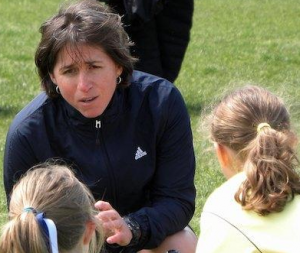Youth Soccer Development: Mental Toughness
As coaches we aim to train our players to be able to develop mastery of soccer’s most used skills. When our players are faced with challenges or adversity how they cope and continue to play on may be an important aspect we need to focus on at our practices. Ideally, we want our players to be prepared to deal with a bad call from an official, a physical play from an opponent, or a missed opportunity in front of the goal.
The fact of the matter is that we need to spend much more time with our team on how to deal with game situations that just do not go our way.
Any skill that we are trying to teach our players requires practice and training. Mental toughness is a term we use often, but we may not truly understand. Through mental toughness training we are cultivating a powerful attitude of coping and perseverance on our youth soccer teams.

If we are truly embracing the player development model over the win at all costs mentality, then we need to make sure we teach over punishing at our practices and games.
What happens when a player makes a mistake?
When a mistake is made, the player knows they did not execute properly. Take the time to explain what the player can do differently next time in that situation. Any player who hang their head after a mistake or hear the negative talk on the sidelines from coaches, need encouragement to get back into the game and play in the moment versus in the past.
Mistakes allow players to get technically and tactically better not only in the physical domain but mentally as well. When a player can overcome negative plays they build self-confidence and are becoming “mentally tough”. Perseverance is the ability to bounce back after a challenge or adversity. Soccer is a game of mistakes; teams gain possession because of a bad pass, a defender wins a ball because of a poor touch, a goal is scored because of a poor clearance and the list goes on. As we set up our practices we need to set up these scenarios so that our players can understand they still need to stay in the play or game because we need the entire team playing defense or offense at all times.
How to promote mental toughness at practices?
From my perspective, mentally tough players are self-confident, play stress-free, and want to meet a challenge head on. It is no secret that players who feel secure in their abilities will perform better than players who are nervous about making a mistake or failing. Self-confident players tend to want the ball at any situation and at all intervals of the game. Self-confident players savor the opportunity to run a play or be in the center of setting their teammates up with a through ball or cross.
The youth soccer sideline can unfortunately be filled with negative comments and too many directions from parents. Players are more successful when they play in a stress-free environment without worrying about the demands of parents. Mentally tough players can focus on what they need to accomplish and execute over what the sideline chatter is trying to dictate. Soccer players who can perform despite the negative talk, are mentally tough.
On the flip side, many parents have been able to understand the importance of positive sideline encouragement. Clearly, players who feel supported, if and when they make a mistake will continually look to try a new move or try to meet challenges because they feel strength in the comfort the receive from encouraging parents and coaches. The idea that mistakes are very much part of the game needs to be enforced and reinforced in our practices. As coaches we need to be teachers focused on explaining and clarifying if we want our players to understand how to cope after a mistake.
How do you know what a player can or cannot do if you do not create scenarios of risk taking and exploring new plays/skills/talents?
Mindful coaches will encourage risk taking at practice where lots of mistakes will happen. Most high-level athletes will tell you that what has pushed them to the next level was that they got beat by someone else. Losing or failing to beat someone one on one motivates mentally tough athletes to bounce back and try harder to overcome that challenge. Setting up those mini-competitions at practices teaches players how to deal with adversity.
Mental toughness is a skill that can be learned. Coaches need to be that conduit to demonstrate to players that soccer is filled with challenges and what separates good teams from great teams is the ability to cope and overcome adversity. Those players who can recover after a bad play standout on the field, we want to celebrate when players can get back up and turn a mistake into an opportunity. As coaches we can find methods of developing not only the physical aspect of the game but also focus on the importance of building mentally strong players through our practice activities.
SoccerToday columnist Dr. Dina Gentile is a Professor of Sport Management at Endicott College. A volunteer youth coach herself, Dr. Gentile understands from both practical and theoretical experience what happens on the soccer field. Gentile has also coached the Endicott College Soccer Team for 11 years. Gentile is also the owner/director of Precision Soccer, LLC, which operates camps, clinics, and coach education training throughout the year. She is a former All-American and Academic All-American at Adelphi University. Gentile has been inducted into the Adelphi University and Endicott College Halls of Fame. In addition, she is a trainer with Positive Coaching Alliance and the Girls Program Director with New England Premiership Club – Benfica USA. She is the proud coach of her daughter’s and son’s soccer teams in Massachusetts.






